Morning shows drive radio station ratings. How can we fine-tune these prime time radio hours and tune into the audience to meet their lifestyle and listening preferences?
Dennis Clark answered this question at the RADIO DAY 2011. He’s the producer of On Air With Ryan Seacrest based at 102.7 KIIS-FM Los Angeles. His keynote was followed by a panel discussion about ‘the morning show of the future’, with German radio programmers and presenters. One of the findings: radio talents should exchange daily life experiences on air.
Radio personalities connect people
The radio strategist and veteran morning show producer knows that we need “real, tangible and credible” presenters to win the battle in radio prime time. “They have to win the listener again and again.” For this to happen, they have to fit inside the target demo. But Clark says that more importantly they have to open up and share their lives with the audience. For the simple that we all connect to people through genuine emotion and humanity. Without authenticity, a radio program would be colorless.
Radio morning show basics
A few important questions for every morning show in every radio market:
- Does your morning show fit the station and its overall image in the market?
- Is your radio personality authentic and can he/she relate to the listener?
- Who is the average person that is listening to your morning show?
- Are your radio topics and content interesting for this listener?
Morning show audience profile
Since radio ratings in most US markets became Portable People Meter based, programmers have learned a lot about how their audience listens. Dennis Clark used PPM research to optimize KIIS-FM’s morning show format. “It’s important to know exactly who tunes into the morning show at what moment”, he says. To have a picture of the average listener, the station defined a fictitious profile of a young woman named Christina. Everything the show puts on the air should be interesting and fun for her to listen to.
 PPM: identify bad content
PPM: identify bad content
Creating interesting content for the audience is important. But in a PPM market it’s crucial to identify bad content and adjust or remove it, because it’s a major cause for switching to another station. Especially boredom is an absolute no go, so always keep listeners engaged. Research shows that the majority of the audience expects continuous fun and entertainment in a morning show, as well as the right mix of music and information.
Stay tuned (or listen again)
One of the most important things a personality can do for the station is of course to keep people listening as long as possible. An interesting view is that when listeners do leave, even after a short while, it’s actually not a problem – as long as they come back soon. Clark advises radio stations to always offer opportunities and incentives to hang on or come back. (That’s why stations try to make appointments with their audience, like Listen tomorrow morning at 7:10 for your chance to win a million dollars.)
 Audience dislikes sudden interruptions
Audience dislikes sudden interruptions
Keep the flow going is essential to keep the audience tuned in. People get turned off by rigid or unexpected changes and ending. Examples: suddenly cutting a music sweep for a stop set; going from a discussion straight into commercials; heading from news directly into what follows. Rather create smooth transitions and introduce what’s coming next – give a brief summary of the following news, or pre-sell the next few songs.
Radio & social media mix
PPM data show that listeners who tune out temporarily, are gone for about one hour before returning to the program. Stations should tell listeners where they can be found in social media, and interact with them online as well. It’s important to tie listeners to the program in as many ways as possible. According to Dennis Clark, classical interaction should not be underestimated, even in this social media world. He advises to keep taking listener calls on air; it still helps to establish personal contact during broadcast time.
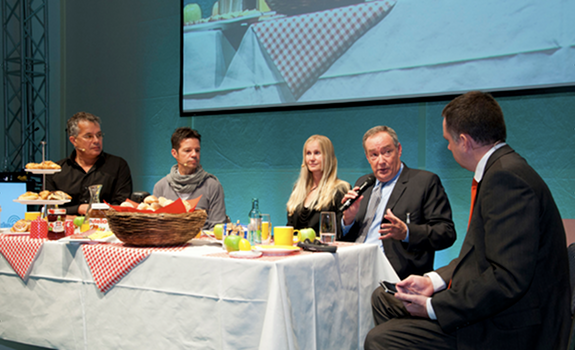
Dennis Clark: “It’s important to know exactly who tunes into the morning show at what moment” (photo: RADIO DAY)
Important radio advertising environment
“A presenter is much more than the music he plays”, says Martin Liss of ENERGY Germany. He speaks about “bringing back the soul of radio” which requires “talent, experience and courage”. Liss mentions that day after day between 7 AM and 8 AM, over 30 million people in Germany listen to a breakfast show on the radio. “It makes morning shows the program highlight and premium advertising environment, which we should always preserve and develop.”
 German radio morning shows
German radio morning shows
“There’s no success without continuity and emotion”, says Ina Tenz, program director of radio ffn. She thinks that morning man Franky is successful because of his sense for people and for their emotions. Especially morning radio is hard work because “you always have to reinvent yourself. Discovering your show again and again is one of the biggest challenges.” The PD adds that creativity, perseverance and support are crucial to achieve long-term success.
Morning show is teamwork
Tenz sees morning show as a mix of “creativity, time and investments”. In her opinion, all departments of the radio station should be involved in it. From the online newsroom to on- and off-air promotion and production, “everyone should be aware of the importance and strategic meaning of the morning show. As a programmer, I focus all the time on a daily fine-tuning of the morning show, because that’s where most listeners tune into the station and gain an overall impression.”
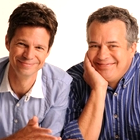 Authentic radio personalities succeed
Authentic radio personalities succeed
Deutscher Radiopreis (German Radio Award) winners for the best morning show, Michael Wirbitzky (left) and Sascha Zeus (right) of SWR3, assume that authenticity is the major reason for their success. “We reflect normal life and use personal family anecdotes”, says Wirbitzky. They expect that listeners will always love Wachmacher und Spaßvögel (funny early birds, or morning jocks) on the radio. Whether distribution technologies change or not.
Comedy is not everything
Does a morning show need to be witty and funny in the first place, or is that an outdated myth? Is morning radio more than just fun & comedy all the time? Program director Ina Tenz explains why ffn rather bets on promotions and stunts that people talk about. Wanting and trying to be funny all the time could sound unreal. Dennis Clark agrees on this, that’s why comedy is only secondary in Ryan Seacrest shows. “The audience appreciates his views on current topics, so what matters most is the personality’s character.”
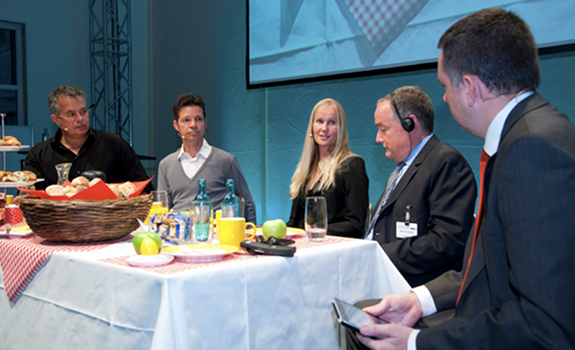
Ina Tenz (middle): “Discovering your show again and again is one of the biggest challenges” (photo: RADIO DAY)
New radio talent necessary
Finding new talent can be a challenge, as concluded in an earlier panel about personality radio. Ina Tenz experiences that “identifying talent doesn’t happen overnight”. It’s interesting that she looks more inside than outside ffn. “I usually look for radio talent in the own ranks, such as volunteers and interns. Castings are usually the least successful way and more a matter of luck.” (So an internship at a well-chosen station could get you into radio faster than sending demos to everyone.)
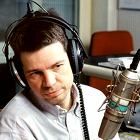 Freedom and self-acceptance matter
Freedom and self-acceptance matter
SWR3 morning show co-host Michael Wirbitzky states that there cannot be personality without guidance – and freedom, because talented people need a chance to develop themselves through experimenting and learning. “Coaching is good, but radio talent should have the opportunity to try and act out”. Wirbitzky adds that “part of being a personality is self-acceptance, for which you need a certain age and maturity”.
Attitude, heart, emotions & depth
What do the panelists hope for the future of morning radio? “More courage to cover topics close to life, which may receive critique and arouse deep emotions among listeners”, says Sascha Zeus, the second 50% of the successful SWR3 morning duo. He adds that radio people should not only scratch the surface of a topic just because they are afraid of “asking too much” from the listener. His colleague Michael Wirbitzky brings in that “research is important, but there should be no shortage of attitude, heart and emotions!”
 Recognition, respect, courage & budget
Recognition, respect, courage & budget
Presenters should include “recognition, respect and courage” in every link, says ffn program director Ina Tenz. Within the radio station she desires “team spirit and empathy for a productive cooperation.” A rational component is added by Dennis Clark, Ryan Seacrest’s morning show producer for 102.7 KIIS-FM – a station owned by Clear Channel. “Budget, budget, budget” is on top of his wish list for the morning radio of the future.
Mean what you say
Radio Hamburg personality John Ment was interviewed on camera on behalf of the morning show session. “To mean what you say” is one of the things he finds important. Ment often hears presenters who deliver the something like the weather very casual – even if it’s sunny and 24°C at the end of October! He suggests that you always adjust your voice to the music underneath. So don’t jump in with a lot of volume and energy if you talk over the end of a jazzy and soulful Norah Jones ballad. But he saves his very best tip for last.
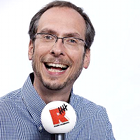 Imagine someone listens first
Imagine someone listens first
“Imagine you’re a morning show host and yesterday evening, you have met someone. It was great and you’re a bit in love. She said that she’ll tune-in to your morning show when she gets up at 6:30. You will go into that link very differently. You might be a bit nervous and excited again, and give everything you’ve got. That’s what matters: doing your best for your listeners. Without them knowing it; without sounding like it’s your job.” [ video ]





Update: a summary of John Ment’s video presentation has been added to the article.
Thanks, Frank!
Thomas
Thanks, Frank.
John shared a great tip in the video you mentioned: think of how you want to sound to someone who listens to you for the very first time. I’ll add it to the article.
Stay tuned!
Thomas
John Ment (German morning host in Hamburg) had a good point in a video they’ve played at the session. He said that the most important thing radio people should do is.. be there for their listeners! Couldn’t agree more to that. Nice article.